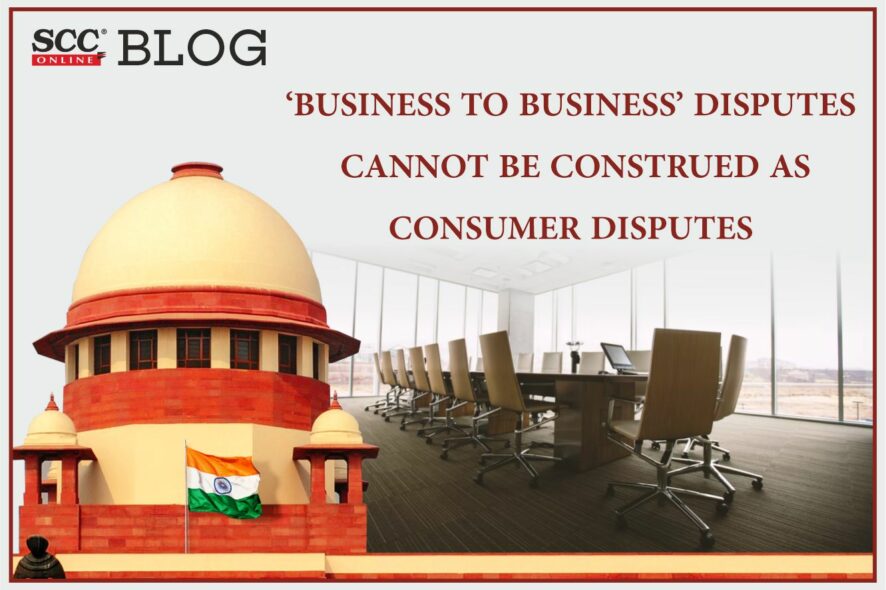Supreme Court: The bench of L. Nageswara Rao and BR Gavai*, JJ interpreted the true scope of a “consumer” in terms of Section 2(1)(d) of the Consumer Protection Act, 1986 and has held that the ‘business to business’ disputes cannot be construed as consumer disputes. The entire Act revolves around “business-to-consumer” disputes and not for “business-to-business” disputes.
Analysis
Section 2(1)(d) of the said Act is in two parts.
- Section 2(1)(d)(i) of the said Act deals with buying of goods.
- Section 2(1)(d)(ii) of the said Act is with respect to hiring of services.
By the 1993 Amendment Act, wherever the word “hires” was used, the same was substituted by the words “hires or avails of”. By the said 1993 Amendment Act, insofar as Section 2(1)(d)(i) is concerned, an Explanation was provided to the effect that ‘commercial purpose’ does not include use by a consumer of goods bought and used by him exclusively for the purpose of earning his livelihood by means of self-employment. Hence, though the original Act of 1986 excluded a person from the ambit of definition of the term ‘consumer’ whenever such purchases were made for commercial purpose; by the Explanation, which is an exception to an exception, even if a person made purchases for ‘commercial purpose’, he was included in the definition of the term ‘consumer’, if such a person bought and used such goods exclusively for earning his livelihood by means of self-employment.
By the 2002 Amendment Act, the legislature has done two things.
- It has kept the commercial transactions, insofar as the services are concerned, beyond the ambit of the term ‘consumer’ and brought it in parity with Section 2(1)(d)(i), wherein a person, who bought such goods for resale or for any commercial purpose, was already out of the ambit of the term ‘consumer’.
- The legislature did was that even if a person availed of the commercial services, if the services availed by him were exclusively for the purposes of earning his livelihood by means of self-employment, he would still be a ‘consumer’ for the purposes of the said Act.
Thus, a person who availed of services for commercial purpose exclusively for the purposes of earning his livelihood by means of self-employment was kept out of the term ‘commercial purpose’ and brought into the ambit of ‘consumer’, by bringing him on par with similarly circumstanced person, who bought and used goods exclusively for the purposes of earning his livelihood by means of self-employment.
“If a person buys goods for commercial purpose or avails services for commercial purpose, though ordinarily, he would have been out of the ambit of the term ‘consumer’, by virtue of Explanation, which is now common to both Sections 2(1)(d)(i) and 2(1)(d)(ii), he would still come within the ambit of the term ‘consumer’, if purchase of such goods or availing of such services was exclusively for the purposes of earning his livelihood by means of self-employment.”
The upshot of the above-mentioned discussion led to the conclusion that when a person avails a service for a commercial purpose, to come within the meaning of ‘consumer’ as defined in the said Act, he will have to establish that the services were availed exclusively for the purposes of earning his livelihood by means of self-employment. There cannot be any straitjacket formula and such a question will have to be decided in the facts of each case, depending upon the evidence placed on record.
Ruling
The Court was deciding the case where NCDRC has come to a finding that the appellant had opened an account with the respondent-Bank, took overdraft facility to expand his business profits, and subsequently from time to time the overdraft facility was enhanced so as to further expand his business and increase his profits.
The Court affirmed the said ruling and observed that the relations between the appellant and the respondent is purely “business to business” relationship. As such, transactions would clearly come within the ambit of ‘commercial purpose’. It cannot be said that the services were availed “exclusively for the purposes of earning his livelihood” “by means of self-employment”.
[Shrikant G. Mantri v. Punjab National Bank, 2022 SCC OnLine SC 218, decided on 22.02.2022]
*Judgment by: Justice BR Gavai
Counsels
For appellant: Senior Advocate Shyam Divan
For respondent: Senior Advocate Dushyant Dave






